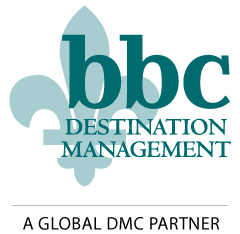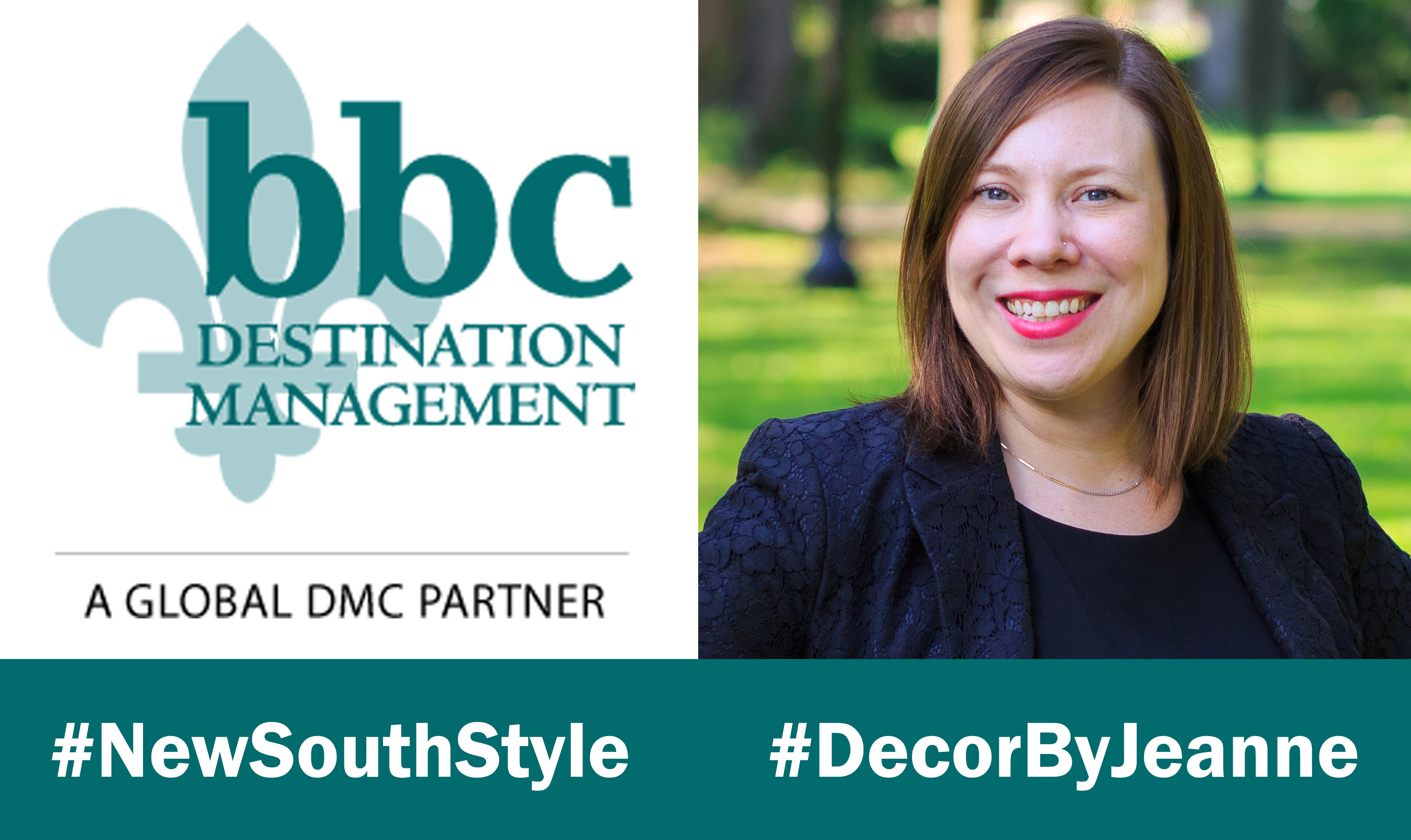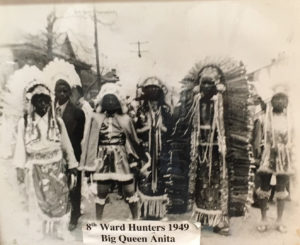#OpsByBBCNola: Your Top Operations Questions Answered by BBC
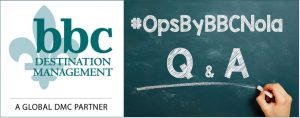
Welcome back to #BBCNola’s Q & A! Now that you’ve selected New Orleans for your incentive program, it’s time to segue into the operational phase and bring your program’s blueprint to life. At BBC, our Operations Managers understand that program logistics can get overwhelming. To help navigate through some of your top FAQs, we gathered our Ops team to share some of their expertise with you. Let’s begin!
FAQ 1: What is the role of the BBC Operations Manager?
BBC Operations Managers serve as the client’s trusted partner and onsite extension throughout the entire production of the event. They’re responsible for securing the “nuts and bolts” of the program to ensure that the execution is seamless; that every event looks effortless and that the guest experience is unforgettable. With a sharp eye for detail, they eliminate the stress of planning, from developing event timelines (down to the very minute) and securing permits to manipulating transportation manifests and strategic problem-solving on the ground.
FAQ 2: What is the operations process?
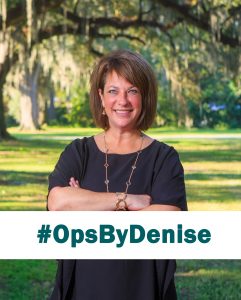
Denise Malo, Operations Director
At BBC, the operations process varies by program. Below is a basic step-by-step breakdown to help guide you.
Program Assignment: Depending on the scope of the program, the Director of Operations may assign the program sooner rather than later in the process. This is so the Account Executive can bring the Operations Manager along with them to the initial walkthroughs of the proposed venues so that logistics can be discussed, establishing a strong sense of trust early on. If the scope of the program is not too large, it will be assigned after the contracting process is complete with the client.
Program Turnover: The program turnover takes place once the contract has been signed. Although the Account Executive still remains involved, the Operations Manager is now the primary contact and liaison between all stakeholders involved in producing the event. The turnover is kicked off with a “Program Review” call, which includes the client, the Account Executive and the Operations Manager. The call ensures that all parties are on the same page moving forward.
Pre-Production: In pre-production, the Operations Manager secures all of the necessary elements for the program. Once finalized, an SOSs (Schedule of Services) is developed for the program. Considered the “the bible” of the program, this “play by play” of each event includes everything from floor plans, dietary restrictions and manifests to risk assessments, contingency plans and contact information. To ensure accuracy, a Pre-Con is held with the client to review all of the event details.
Onsite Production: Now that the program has been reviewed during the Pre-Con, the event elements on paper are just days away from becoming a reality. The Operations Manager is now responsible for being onsite, interfacing with the client and guests. In addition, he/she will be advancing elements as needed, managing onsite staff, problem-solving and executive decision-making throughout the duration of the program.
Post-Production: At this point, the program is complete and finalization of the client billing begins. This invoice is usually for the remaining balance on any additions or overages. Once the final invoice is developed, internally, the Operations Manager will close out the program. Depending on its scope, a post-con meeting may be held with the Account Executive, Operations Manager and the client to evaluate the program.
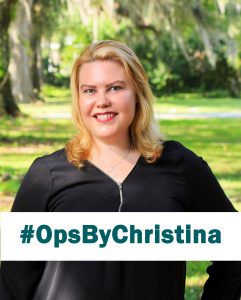
Christina Pohlmann, Operations Manager
FAQ 3: How many people are on the BBC team and how is staff allocated onsite?
BBC has 13 full-time staff of Directors, Sales/Account Executives, Operations Managers and Creative Services Managers. Depending on the size and complexity of the program, the team will divvy up the operational tasks as needed. While each department specializes in a specific area, the BBC team is extremely well-versed in event production and the execution of event logistics.
For the provision of onsite (contracted) staff, BBC typically allocates one staff person per 100 guests. Certified contracted staff varies greatly per event. Being that they are an extension of the Operations Manager, contracted staff will assist with special events, transportation, tours, hospitality desk, parades and dine arounds (to name a few).
FAQ 4: How does BBC’s airport transportation work?
BBC takes airport transportation seriously; after all, it is the first impression on guests when they arrive and the last impression of the city before they leave. To best serve the client, airport logistics begin when the client sends over their manifest. In the earlier stages, BBC Ops works with their client to determine what the guests expectations are in terms of quality and service. Will this group need private sedans or a shuttle, for example. Will all vehicles need cold, bottled water on them? Snacks? Etc. From there, BBC provides the client with the best, most cost-effective transportation options. The Operations Manager then takes the information, formats it into BBC’s user-friendly template, and manipulates it to determine the equipment and staff needed for that specific arrival structure.
Once transportation is finalized, BBC contracts the necessary staff and equipment for the arrivals and departures while working closely with the client to make any last-minute changes. The minute that guests disembark the plane, BBC staff is stationed throughout the airport ready greet the passengers at the baggage claim with signage (and smiles!) as they guide the guests to their correct transfer.
FAQ 5: How does BBC accommodate food and beverage requirements?
One of New Orleans’ top selling points is its critically acclaimed, culturally rich cuisine and signature craft cocktails. While there is literally something for everyone, food and beverage requirements play a key role in the logistical planning.
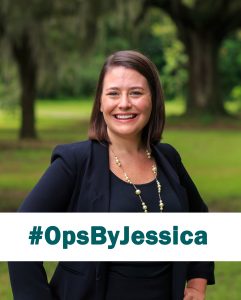
Jessica Aubin, Operations Manager
To give guests the best in dining experiences, both the client and the operations manager must have a clear understanding of each group’s needs and attendee demographics. For instance, are there certain foods that cannot be eaten due to religious backgrounds? Are there food allergies/dietary restrictions that need to be considered? What times of the day is the group used to eating? Does the group consist of heavy or light drinkers? The more details and advanced notice, the better!
Fortunately for guests, New Orleans’ restaurant industry is so robust that just about every restaurant and/or caterer is able to accommodate its menu to fit any group. From vegans to pescatarians, shellfish allergies and Kosher, we will find a way to accommodate that need. BBC can even partner with another food provider to specially prepare and deliver the meal to the venue.
Helpful tips to Dietary Requirements
- Buffets– labeling each dish– not just ingredients but also the type of food category the dish belongs to, i.e. “Vegan” or “Gluten Free” on the label
- For large groups- partner with the client to identify food allergies so that, for example, food service staff can easily prepare place settings with color-coded cards.
FAQ 6: How are parades organized?
One of the more culturally exciting transportation offerings – unique to New Orleans – is “Parading” a group throughout the city. BBC has perfected the art of customizing parades that vary in size and complexity. From a Jazz Trio leading a small group to interactive elements such as revelers, stilt walkers, high school marching bands, the 610 Stompers, floats and circus animals – YES! BBC marched Elephants down Canal Street! BBC will find the perfect elements for your group and budget.
Once these elements are defined, BBC’s Operations manager partners with the city to secure the required permits, entertainment elements and staff. The team also designs a custom route for the parade, which averages out to six city blocks (approx.: 20 minutes walking).
A Few Parade Facts:
- In true Mardi Gras fashion, Parades will roll – rain or shine – unless lightning and thunderstorms are in the forecast. Have no fear of light rain – BBC can provide ponchos onsite if requested.
- Parades roll on the streets and not on the sidewalks. Whether it’s a group of 10 or 10,000, multi-lane thoroughfares will be completely blocked of traffic exclusively for your group.
- The Route is TBD – Even though the Ops Manager submits the preferred route, it can be adjusted by the NOPD as late as minutes before the parade is set to roll. If a street closure or any unplanned interruption occurs between the submission of the permit and the parade date, the NOPD will reroute accordingly.
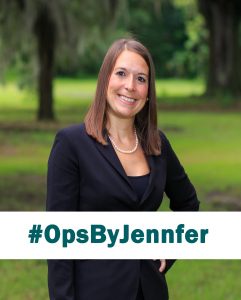
Jennifer Stanton, Operations Manager
FAQ 7: What will the weather be like in NOLA and how does BBC accommodate?
Weather in New Orleans is ever-changing! Luckily, most NOLA storms pass over in cells, meaning, if it rains, it will not last for long. If you’re looking for reliable weather apps, BBC Operations recommends Weather Underground, Dark Sky and the local news (WWL/WDSU).
In terms of weather backups, depending on the severity of the weather and the venue, BBC can and will move the event indoors. Either a “contingency call” will be made, which gives the client 48 hours prior to the event to decide on whether or not to add a tent, additional indoor space, etc. or an executive decision by the BBC Operations Manager will be made.
FAQ 8: Communication is Key – The Benefit of having one Point of Contact (POC)
To ensure a program’s success, lines of communication need to be open, yet structured. To ensure that all communication is streamlined, the BBC Operations Manager will always provide their cell phone number to the client/meeting planner. From there, the Operations Manager will remain the main point of contact (POC).
When issues arise during the program, typically, the flow of communication is as follows: the guest will contact the planner; the planner then contacts their Operations Manager and the Operations Manager communicates any issues to the necessary parties. Generally, the Operations Managers will not provide the client with their staff’s numbers unless it is absolutely necessary. Once there are guests calling staff and the lines of communication are blurred with multiple contacts on both sides, elements are missed and expectations are unmet.
